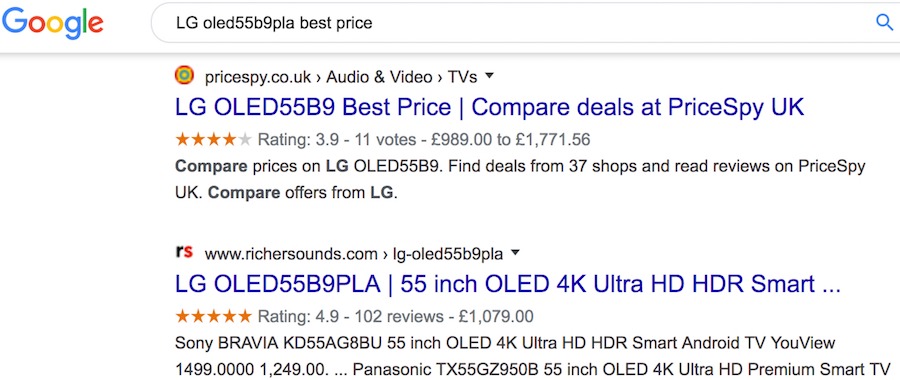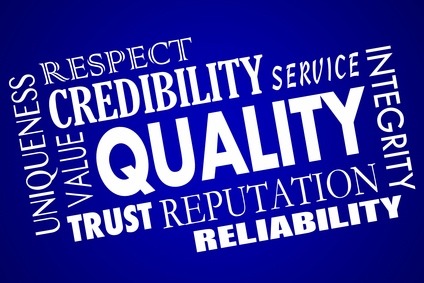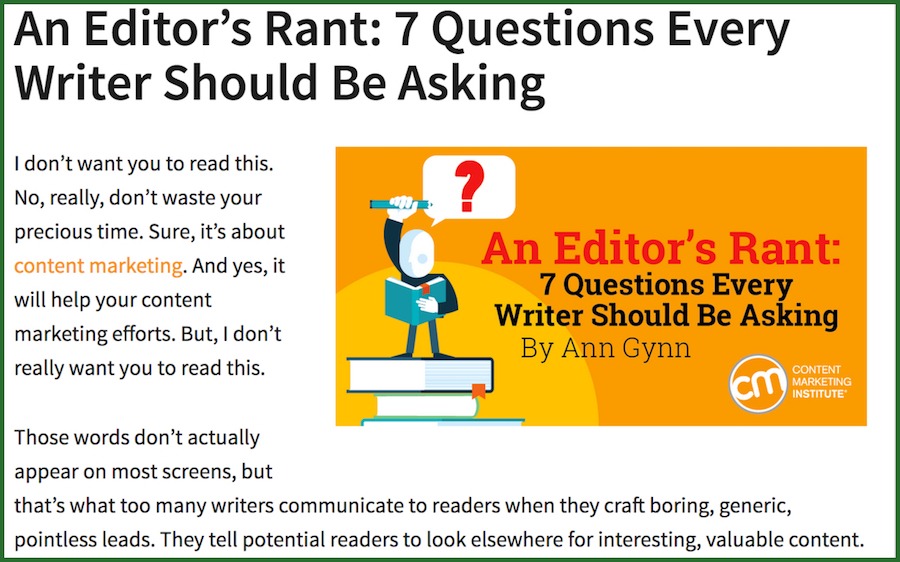14 Things Great Content Writers Do That Average Writers Do Not https://ift.tt/2ScIEBk https://ift.tt/2S4InA5
No one said becoming a great content writer would be easy!
Your writing is not getting the attention you had hoped for.
You are getting discouraged. You are considering giving up.
This is the dilemma every content writer faces.
Some days the words flow easily. Other days it is a struggle.
You question the process. What are you to do?
There is a solution…
Discover how the best content writers create informative, entertaining and engaging content that readers love to read and share.

14 of the most important skills the average writer needs to develop in order to become a great content writer
#1 The Best Writers Deliver Actionable Content
It was Seth Godin who said…
“Why waste a sentence saying nothing?”
If only more content writers understood that!
Too many so called content writers are paid by the word rather than the quality of their article. This is why there is so much nonsensical content that is “wordy” and mind numbing.
Even good writers (yours truly included) sometimes make the mistake of “rambling” and not being on message.
Actionable content is content that is easy to implement. It is content that readers find educational, relevant, entertaining and unique. One of the best examples of this is ‘how-to’ posts.
In the case of a Blog having actionable content will give your visitors a reason to subscribe to your email list. Actionable content will inspire readers to bookmark your page and return.
In the case of an eCommerce store actionable content persuades the reader to buy your product.
#2 Great Content Writers are Great Storytellers

Who doesn’t love a good story?
Storytelling has helped brands around the world communicate with their customers and improve brand loyalty.
But don’t confuse a good story with fiction.
In my opinion the best stories are TRUE.
As content writers one of the best places to demonstrate this is the About Us page.
Take for example this page on the Warby Parker website:

The Three Essentials of Story Telling for Business…
=> Define Your Audience
Create a customer avatar or detailed profile of your ideal customer.
What matters to them? What are their values?
=> Set your intentions
What’s your purpose in telling a story?
=> Tell people your why
When you explain your ‘why’, you’re sharing your values and beliefs.
Recommended: The 12 Secrets To Influencing With Story (FREE report)
#3 Use Short Words, Short Sentences and Short Paragraphs.
We live in an era of limited attention span.
With some much content available to read it is natural for readers to skim your content first to determine if it is worth their while to read the whole article.
Using short paragraphs along with appropriate and engaging headings makes it easier for a reader to initially skim.
The same applies to sentences. Two sentences is almost always better than one long sentence.
If a sentence is longer than it would be comfortable for you to speak, then it’s probably too long.
Use short words, short sentences and short paragraphs. Get to the point without wasting words.
#4 Do Extensive Keyword Research
Keyword research is the bread and butter for any content marketing campaign. Only when you choose the right keywords you can reach the right people.
Our favorite keyword tool is provided by SEMrush.
Their Keyword Tool allows you to track long-tail keywords, which represents about 70% of all search traffic.
But not all traffic and keywords are equal…
Let’s say you have an eCommerce store selling TV’s.
In this instance, when a web visitor searches for a particular model number of TV or a product review of that TV there is a good chance they are active BUYERS looking to purchase right now! These are top level keywords that demonstrate buying intent and are the most valuable keywords.
But these are not the only keywords you can focus on. There are secondary keywords that demonstrate a more general interest. In these instances, there is a good chance that the potential buyer is still in the research stage and not yet decided on brand or model.
These are still valuable keywords – but not quite as valuable as the top level keywords.
And finally, there are the broader types of keywords. These keywords often bring the most traffic, but it is traffic that is less targeted.
Going back to the eCommerce store example.
Here they are:
- Hot traffic: Has buying intent (for example: “XYZ brand TV best price”)
- Warm traffic: Considering to buy (for example: “XYZ brand TV review”)
- Cold traffic: No buying intent (for example: “How does a TV work?” or even just plain “TV“)
Assuming you have a marketing funnel you will treat the traffic from these keywords differently.
For example the hot traffic could got to a product description page that lists the features and benefits along with a Buy Now Button while the colder traffic may be offered the opportunity to join your mailing list with the offer of a Newsletter, Lead Magnet or PDF Report. This colder traffic can then be “warmed up” over the coming months with free information and offers.
Below we have an example of Hot Traffic you will see a search for an LG TV.
Clearly anyone who searches for “LG oled55b9pla best price” is likely to be a buyer and therefore a valuable search term that a content writer will want to target.

A search term like [Product + Model Number + best price] is a transactional keyword.
Transactional keywords are keywords or keyword phrases potential customers will use to find the services or product they are looking to buy. In the case of an eCommerce site you will want to add content (blog posts and article descriptions) that target these Transactional keywords.
#5 Great Content Writers Create A Marketing Funnel
Bringing the visitors to your website is an important step.
However, It’s only one piece of the equation.
Too many writers have no real plan once they have visitors on their website.
Sure, they “hope” the visitor will take action but “hope” is not a plan!
When it comes to pure lead generation, Landing Page software from companies like Clickfunnels and Instapage do a great job of getting visitors to take action, but what if they are not appropriate for your product or service?
You can’t leave the fate of our business to chance.
You need a solid plan that will convert those visitors into revenue and profit!
This starts with understanding why people are visiting our website in the first place.
If your content writing is providing the information your visitor wanted then you are well on the way to building rapport and trust with that visitor.
In some instances the next step will be for the visitor to opt-in to a mailing list while at other times it will be more appropriate to take them to a sales page.
The point is to have a plan. If you are doing your job right, you will be providing a lot of easy to understand information, which naturally warms the visitor up for the next step.
Related:
=> Learn How To Create a Sales Funnel (Pinterest collection of of sales funnels that you can swipe and use for your own business)
=> Check Out The No Leakage Rule (step 5 of guide on how to make money online)
Remember, all the best businesses start with solving a problem!
#6 Great Content Writers Stay On Topic
A lot of writers, myself included, will on occasion, go “off topic”.
Just because something is mildly related to the topic you are writing about does not mean you need to include it in your article.
The best way to keep ON TOPIC is to do an outline before you start.
What is the main point you want to make? What do you need to say to support that point?
If it doesn’t make your message clearer, keep it out!
Keep your content fluent, concise and straight to the point at all times.
Remove any redundant words or sentences from your content.
Redundancy not only lowers the user experience but harms your SEO rankings. Google can algorithmically detect how relevant your content is by using certain data points together with your headlines and user engagement metrics.
#7 Establish Credibility

To come across as a credible writer and an expert there are a few basic rules you should always follow:
=> When you provide information that includes numbers, and statistical data…
Always refer to the original source by linking to it.
=> If you make a claim (quote a report for example)
Again, link to that resource or supporting material.
Too many writers regurgitate thoughts and ideas as though it was their own. I have seen this with my own writing, people copy it but don’t link to the source.
Failing to give credit when your write damages your credibility not only with the reader but with the search engines.
=> Cut back on the hyperbole.
There is enough hot air and inflated egos on the internet already. It might get you noticed but in the long run it is a fail.
=> Use testimonials.
Feedback from happy customers is one of the best selling tools you can use.
=> Be honest
Yes, this is stating the obvious, but far too many writers elaborate on their success and some even tell outright lies.
=> Show, don’t tell.
Will a video or a graphic communicate your message better than the written word? If it will, then use it! Today content marketing is not just about writing good copy, it is about demonstrating your offering – and the more modalities you use the better.
Of course as you improve upon your writing skills you will also improve upon your credibility.
#8 Write In A Conversational Manner
If you want to build credibility and trust with your audience, you need to write in a conversational tone.
In other words, “write as you talk”.
Conversational writing is writing that sounds more like a conversation between two people.
Often, sentences will start with pronouns and end with verbs. They may even begin with “and,” “but,” and “yet.”
Remember in school being told no sentence should ever start with “and”? Forget that rule!
In short conversational writing often breaks the rules of grammar – but despite that this type of writing is becoming increasingly popular.
#9 Use Appropriate Tonality

When we talk with people in real life, we use tone of voice, facial expressions and body language to communicate.
But when you write words on a screen or paper, unless the reader is aware of your tonality it is easy to be misunderstood.
Sure, you can use emojis, but as a professional content writer I try to avoid that.
So, how do you create the right tone for you and your brand?
Here are a few things to consider:
=> Make sure you understand your audience and how they relate to your business.
Audience surveys and questionnaires are a good way to do that.
When you write, address their concerns and worries. Speak their language.
Ask yourself this: If I was the readers position, what would I want to know?
My obligation as a content writer is to help my reader, no matter if they are a potential customer or someone just researching.
=> Be respectful of the opinion of others
Not everyone is going to agree with what you write. This is especially the case if you are involved in political content writing.
Their will be haters. Don’t let it get to you.
The “tone” you set should always be respectful. But of course this is just my opinion!
=> Encourage and Inspire
As a Blogger that targets the make money online niche and entrepreneurs generally I strive to strike a tone that offers encouragement and inspires.
But even out side that niche there are plenty of areas in which you can encourage and inspire. As an example, if your in the travel niche then there are plenty of ways your writing can inspire readers to take the vacation of a lifetime.
Very few writers become successful by discouraging and demotivating their readers.
#10 Ask Questions
I often use questions to start an article.
Asking questions improves engagement, arises curiosity, and encourages thinking.
To become a great content writer you need to encourage a dialogue with your reader.
If your content only has statements, and a one way flow of information, readers will not be engaging with our content.
Using questions pulls your reader in.
Not only that, asking questions, makes your writing more conversational. [#7 above]
But becoming a successful content writer is not just about asking your readers questions. There are also questions you should ask yourself before writing any article.
Recommended: Ann Gynn has written a particularly good article on Questions Every Writer Should Be Asking Themselves over at the Content Marketing Institute.
I especially like how Ann started her article by saying: I don’t want you to read this:
#11 Write Using An Active Voice
Active voice means that a sentence has a subject that acts upon its verb. Passive voice means that a subject is a recipient of a verb’s action. You may have learned that the passive voice is weak and incorrect, but it isn’t that simple.
A quick example of an active voice:
I am drinking coffee.
A quick example of an passive voice:
Coffee is being drunk by me.
When you write using the “active voice” it is easier to understand. Using active voice keeps your content more concise and straightforward.
Keep in mind, many of your readers speak English as a second language. To understand a passive sentence requires a higher level of reading skills.
The active voice conveys a strong, clearer tone while generally speaking the passive voice is subtler and weaker.
#12 Use Multimedia
Articles that consist of blocks of text without any multimedia is a big turn off. Add images, add video, use diagrams!
Content with images are more likely to get more shares and engagement. However, do take the time to source images that genuinely complement your article. Stock images are fine but make sure they are on topic and if necessary purchase the image rather that relying on “free” images.
#13 Proofread Your Copy

Triple check your spelling and grammar.
It is easy to miss an error, I do it all the time.
Reading content out loud is one of the best ways to spot errors.
Or ask a friend or partner to read your copy.
Not only may they spot an error but they may also point out room for improvement.
I regularly find grammatical errors in blog posts I first published a year or more ago.
That is why as boring as it may appear you should read that article you are just about to publish, one more time!
Our Contact Us page has an option to select “Website Error or Bug” and from time to time some kindly folks take the time to point out spelling mistakes etc. I don’t see many blogs doing this. It is something I recommend.
Related: 15 Editing & Proofreading Tips Every Blogger Should Know
#14 Make Sure Your Introduction Grabs The Readers Attention
I have deliberately left what I consider the most important part of a great content writer to the end;
THE BEST CONTENT WRITERS ARE EXPERTS IN WRITING INTRODUCTIONS WHICH PERSUADE THEIR READERS TO READ THE WHOLE ARTICLE.
Remember what we said earlier about readers attention spans getting shorter while at the same time there is more information being shared?
Frankly if you are no prepared to take the time to research and produce an article of outstanding quality you shouldn’t be a content writer.
In the world of sales there an acronym with the initials: AIDA
AIDA stands for Attention, Interest, Desire, and Action.
The same can easily be applied to article writing. If you don’t get the readers ATTENTION with a strong INTRODUCTION, you will never create the interest to read the rest of your article. This in turn means you will not create any desire on the part of the reader to take action.
Related:
=> How To Write An Irresistible Intro To Your Blog Post
=> Convert Your Skimming Visitors to Addicted Blog Readers
BONUS:
Content marketing and being a content writer is not a new idea. It is just an Internet Age term for business writers and copywriters.
The Internet Age has made the need for such writers even greater.
Which of course raises a question that I am asked a lot…
How Do I Get Started As A Content Writer
My usual rather flippant answer is… with a lot of practice!
But if I want to be more practical I would say that the best writers of any type (fiction, non-fiction and content) do one thing in particular…
They Write Every Day.
Even if you only write a single paragraph, consistently writing something will make you a better writer. Writing is like a muscle, you have to exercise it regularly to develop and keep it in shape.
So set aside some time each day, even if only just 15 minutes to start with — to write.
Becoming a great content writer does not happen by accident, it requires a plan!
Many writers, myself included, find that writing early in the morning works best. Between 6 am and 8am is some of my most productive writing time. I often accomplish 50 – 70% of my daily writing target in that period.
For you it may be different and of course if you are being employed to write you will be expected to write more than a couple of hours per day! In time, each of us find our own natural writing rhythm.
Right now the most important thing to do is to get started and develop that writing habit.
Perhaps the greatest reward for a successful content writer who is also a blogger, is that is you choose the correct evergreen topic you can write a blog post that quite literally pay you for years. Many of our most successful blog posts still produce significant income years later!
That is why despite the attractions of eCommerce and selling a physical product here at IncomeDiary we have stuck with publishing articles that answer the type of questions fellow bloggers and entrepreneurs are likely to ask.
Related Articles:
17 Writing Tips For Bloggers Who Think They Can’t Write!
And for a contrarian view on the writing every day, you may enjoy this post by Cal Newport
Author Bio:
 Barry Dunlop is a lifelong Entrepreneur, Business Coach and Sales Turnaround Expert who is passionate about helping business owners to grow their businesses and make a positive difference in the world. You can contact Barry HERE or connect with Barry on LinkedIn
Barry Dunlop is a lifelong Entrepreneur, Business Coach and Sales Turnaround Expert who is passionate about helping business owners to grow their businesses and make a positive difference in the world. You can contact Barry HERE or connect with Barry on LinkedIn
The post 14 Things Great Content Writers Do That Average Writers Do Not appeared first on How To Make Money Online.
from How To Make Money Online https://ift.tt/2S4InA5
via IFTTT https://ift.tt/2n0ZAg2


Comments
Post a Comment